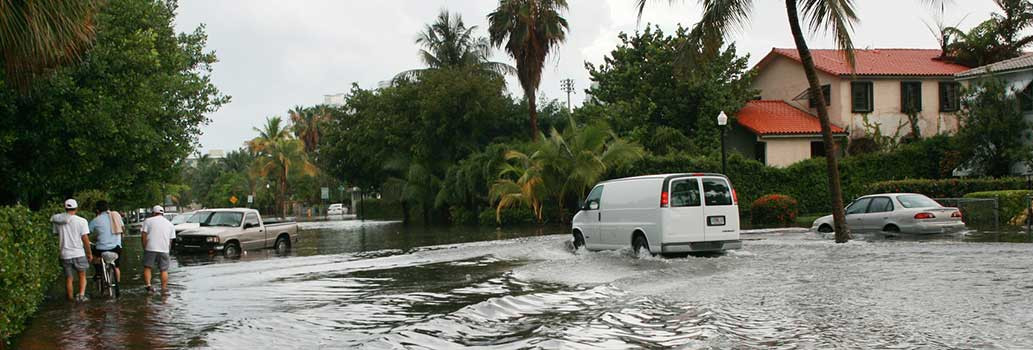Recovering from a Disaster
Be sure to follow safety precautions and avoid injuries when inspecting post-storm damage.
General guidelines
After the storm has passed and you've confirmed that everyone is okay, it's time to assess the damage and begin the recovery phase. Here are some tips to keep in mind when inspecting your home post-hurricane: Before returning home after an evacuation, make sure that the authorities have declared the area safe.
- Electrical power and natural gas or propane tanks should be shut off to avoid fire, electrocution or explosions.
- If you suspect a gas leak, turn off the main gas valve, open all windows and leave the house immediately. Then call your gas company. Do not return to the house until you are told it is safe to do so.
- Do not drive or walk through standing water. It may be much deeper than you realize and there may be hidden hazards.
- Keep manhole covers closed when streets are flooded. Opening manhole covers can alleviate the local flood impact, but it introduces additional water to the sewer system and can cause overflows.
- Learn proper safety procedures and operating instructions before operating any gas-powered or electric chainsaw.
- When using any power equipment, always wear a safety face shield or eyeglasses and gloves.
- Use battery-powered lanterns and flashlights instead of candles.
- If you must use candles, make sure you put them in safe holders away from curtains, paper, wood or other flammable items.
- Never leave a candle burning when you are out of the room.
- Contact your insurance agent. Take pictures of damage. Keep good records of repair and cleaning costs.
- Submit a Neighborhood Damage Assessment Form.
Electrical damage
- Your electrical system may have been damaged. If you see frayed wiring or sparks when you restore power, or if there is an odor of something burning but no visible fire, you should immediately shut off the electrical system at the main circuit breaker.
- You should consult your utility company about using electrical equipment, including power generators. Be aware that it is against the law and a violation of electrical codes to connect generators to your home's electrical circuits without the approved automatic-interrupt devices. If a generator is online when electrical service is restored, it can become a major fire hazard. In addition, the improper connection of a generator to your home's electrical circuits may endanger line workers helping to restore power in your area.
- Replace the electrical outlet and have the system checked by a certified electrician before turning on the circuit breakers and energizing the outlet for use.
Water damage
Following a storm, if flooding is affecting the interior of your property, report it by calling 311. If you have broken or leaking pipes, call the Water and Sewer Department at 305-274-9272.- Once you have established that no structural, electrical or gas-related hazards exist in your home, dry and disinfect all materials inside the house to prevent the growth of mold and mildew.
- Walls, hard-surfaced floors and many other household surfaces should be cleaned with soap and water and disinfected with a solution of one cup of bleach to five gallons of water.
- Be particularly careful to thoroughly disinfect surfaces that may come in contact with food, such as counter tops, pantry shelves, refrigerators, etc. Areas where small children play should also be carefully cleaned.
- Wash all linens and clothing in hot water, or dry clean them. For items that cannot be washed or dry cleaned, such as mattresses and upholstered furniture, air dry them in the sun and then spray them thoroughly with a disinfectant.
- Steam clean all carpeting.
- If there has been a backflow of sewage into the house, wear rubber boots and waterproof gloves during cleanup. Remove and discard contaminated household materials that cannot be disinfected such as wall coverings, cloth, rugs and drywall.
- Remove all wet or damaged carpeting and drywall to prevent molding.
Home repair after the storm
If your home is damaged and you're hiring a home repair contractor, use this checklist to avoid being a victim of fraud:- File a claim with your insurance company.
- Know your contractor. Call references and beware of scams.
- Check complaint history with consumer protection agencies.
- Check the license and insurance.
- Obtain at least three estimates.
- Get promises in writing.
- Avoid paying large sums of money up front.
- Pay by credit card instead of cash.
Learn about your rights regarding price gouging. Substantially increasing the price of critical goods under emergency conditions is forbidden by law.

Emergency Management
Pete Gomez
R. David Paulison Fire Rescue Headquarters
9300 NW 41st St,
Miami, FL 33178-2414
305-468-5400 | [email protected]

